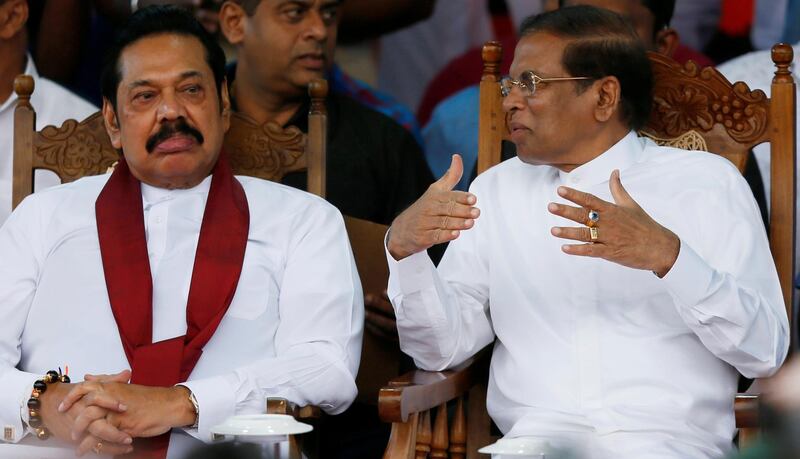Sri Lankan President Maithripala Sirisena has dissolved parliament and called a snap election, a move that the country’s biggest party said it would challenge legally next week.
The Sri Lankan leader’s decision has plunged the South Asian island into further political turmoil two weeks after he sacked incumbent Prime Minister Ranil Wickremesinghe and replaced him with former president and strongman populist Mahinda Rajapaksa.
Parliament was set to convene on November 14 to vote on who was the country’s legitimate premier but Mr Sirisena has now called for an election to take place on January 5, leaving Mr Rajapaksa as Sri Lanka’s potential caretaker prime minister until then.
The move was widely criticised by lawmakers who represent a majority in the 225-seat parliament. They have called Mr Sirisena’s move unconstitutional and an attack on democracy in Asia’s oldest.
Susil Premajayantha, a member of Mr Rajapaksa’s party, said the president had called the snap election to end the political crisis and put the choice to the Sri Lankan people.
“Now we have a caretaker government with limited functions,” he said. “We will conduct a free and fair election.”
But the party of Mr Wickremesinghe, the United National Party (UNP), said it will challenge the decision at the Supreme Court.
“We will go to the courts,” Mangala Samaraweera, finance minister for Mr Wickremesinghe, said. “We will fight in the courts, we will fight in parliament and we will fight at the polls.”
The ousted prime minister has holed himself in the official residence of the premier, known as Temple Trees, surrounded by thousands of his supporters who say they are there to protect him from removal.
_______________
Read more:
Sri Lanka's Tamils fear bloody return of 'Tiger killer' Mahinda Rajapaksa
Sri Lankan press freedom crushed following Mahinda Rajapaksa’s return
Inside Temple Trees: Prime minister’s bungalow becomes Sri Lanka’s seed of resistance
_______________
Mr Sirisena’s decision comes after it became clear that his choice for prime minister would not garner enough votes in parliament to secure a majority.
His decision and suspension of parliament in order to delay a vote on the prime minister has been tainted by accusations of vote-buying. One lawmaker from Mr Wickremesinghe’s party said he was offered $2.8 million and a ministerial position in return for joining Mr Rajapaksa’s side.
To consolidate his position and his decision, Mr Sirisena has taken control of state media outlets and appointed ministers to his side. They will have access to state resources ahead of the election.
The man who served as president for ten years from 2005 to 2015, and ended the civil war with the Tamil Tigers through a bloody offensive, has not given a public address about his nomination as prime minister.
But he reacted to Mr Sirisena’s decision on Saturday. "... A general election will truly establish the will of the people and make way for a stable country," he wrote on Twitter.
The majority of the international community has criticised Mr Sirisena’s moves as not adhering to the constitution. Washington was quick to protest his sacking of parliament.
"The US is deeply concerned by news the Sri Lanka parliament will be dissolved, further deepening the political crisis," the US State Department said in a statement.
"As a committed partner of Sri Lanka, we believe democratic institutions and processes need to be respected to ensure stability and prosperity," it said.
The country is likely to remain paralysed for the next two months if Mr Sirisena’s plans go ahead, with two parallel governments operating almost side-by-side in Colombo, the country’s capital.
Mr Rajapaksa, as caretaker prime minister, at least for now, will remain so until a new parliament convenes on January 17 after the election.





